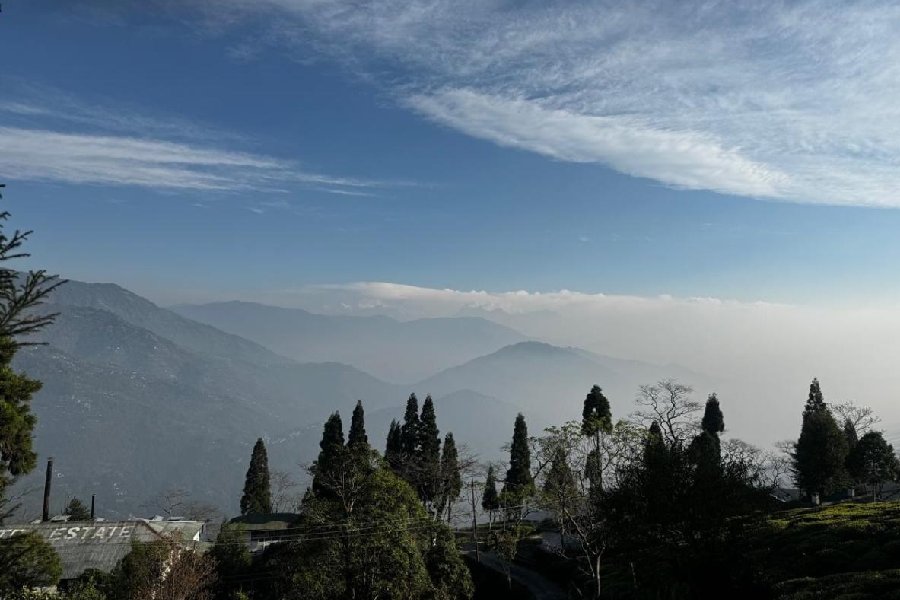To profit or to preserve — that is the question bothering the local communities of Darjeeling.
The famous hill town of north Bengal is at present grappling with “over-tourism”.
The recent spell of heat wave across south Bengal has triggered an exodus of tourists to flock to the “Queen of the Hills”. But ironically, respite for the tourists has posed a problem for the indigenous communities and local residents in the hills.
Samridhi Chettri, 26, who owns a family-run guest house, is grateful for tourists, but at the same time, fears an excess.
“Water shortage has been a perennial problem here in the hills. Boarders at the high-end hotels may not face the problem, but locals like us have to buy water at Rs 6 per litre,” said Chettri.
She also flagged the inadequate waste management systems failing to cope with the excessive tourism.
“We, the locals, suffer because of the plastic and aluminium wastes that tourists dump here during their stay. A proper waste disposal mechanism should be in place. It is not there,” she added.
Dipen Thakuri, the chairman of the Darjeeling Municipality, said “tourism is fine, but ‘over-tourism’ might be a problem”.
However, he said the civic body was working “day and night” to address the waste disposal problem. “Every day, on average, we are collecting 90 metric tonnes of solid waste from the town and its adjacent areas.”
It appears that a desire to make up for the lost time after the pandemic and excessive heat in the plains are driving tourists in droves to Darjeeling.
This overcrowding, while economically a boon, poses many long-term problems for the local people.
Ankit Tamang, a Darjeeling taxi driver, expressed his frustrations: “Traffic congestion here has reached almost breaking point. The stretch that should have been covered by 10 minutes is now taking 40. On top of that, parking is a problem. Navigating Darjeeling streets is our daily struggle because of this tourism surge.”
According to official sources, the tourist influx in and around Darjeeling has gone up threefold this summer.
“The British laid the foundation of Darjeeling, and some elements of our infrastructure, such as the roads, are remnants of that era. Unfortunately, this means we face limitations in expanding our roads, unlike cities in the plains where expansion is more feasible. Consequently, the surge of tourists leads to road congestion here,” said the municipal chairman.
Some ethnic people welcome the surge. Nima Wangdi Sherpa, who heads the Bhutia Development Board, said tourism was necessary to help the local economy thrive.
The tourist rush gets a bit out of hand only in summer, but for the rest of the year, it’s not that hectic, he said. “We’ve got about 17 development bodies looking after our indigenous communities. Our culture and traditions stay safe and sound, even with the increase in tourists,” Sherpa added.
Among the worst sufferers of “over-tourism” are businesses and individuals associated with the tourism industry. For the hospitality sector, there is the dual challenge of meeting the growing demand while maintaining quality standards.
Sunil Rai, owner of a hotel, lamented the toll on their operation: “For us, it’s become a tightrope walking between service and maintenance. Yes, often we are unable to provide accommodation to travellers as rooms are unavailable. Nevertheless, we are trying to rise to the demand.”
The “over-tourism” problem has spilled over to upset the ecological balance of the region, as many believe. Steps to address excessive tourism must prioritize the environmental impact on Darjeeling’s delicate ecosystem.
Bharat Prakash Rai, the general secretary of the Federation of Societies for Environment Protection, admitted the adverse effects of tourism on Darjeeling’s ecology. “Over-tourism accelerates environmental degradation, threatening our forests, water bodies and wildlife. There is a notable depletion in the number of birds in our forests. Unchecked tourism activity is one of the reasons. Without sustainable management practices, we risk irreparable harm to our natural heritage,” said Rai.
The path forward, many believe, demands thoughtful consideration of the impact of “over-tourism” on all fronts.
“From preserving cultural heritage to safeguarding the environment, sustainable solutions are essential to ensure a brighter future for all who call Darjeeling home,” Rai added.










